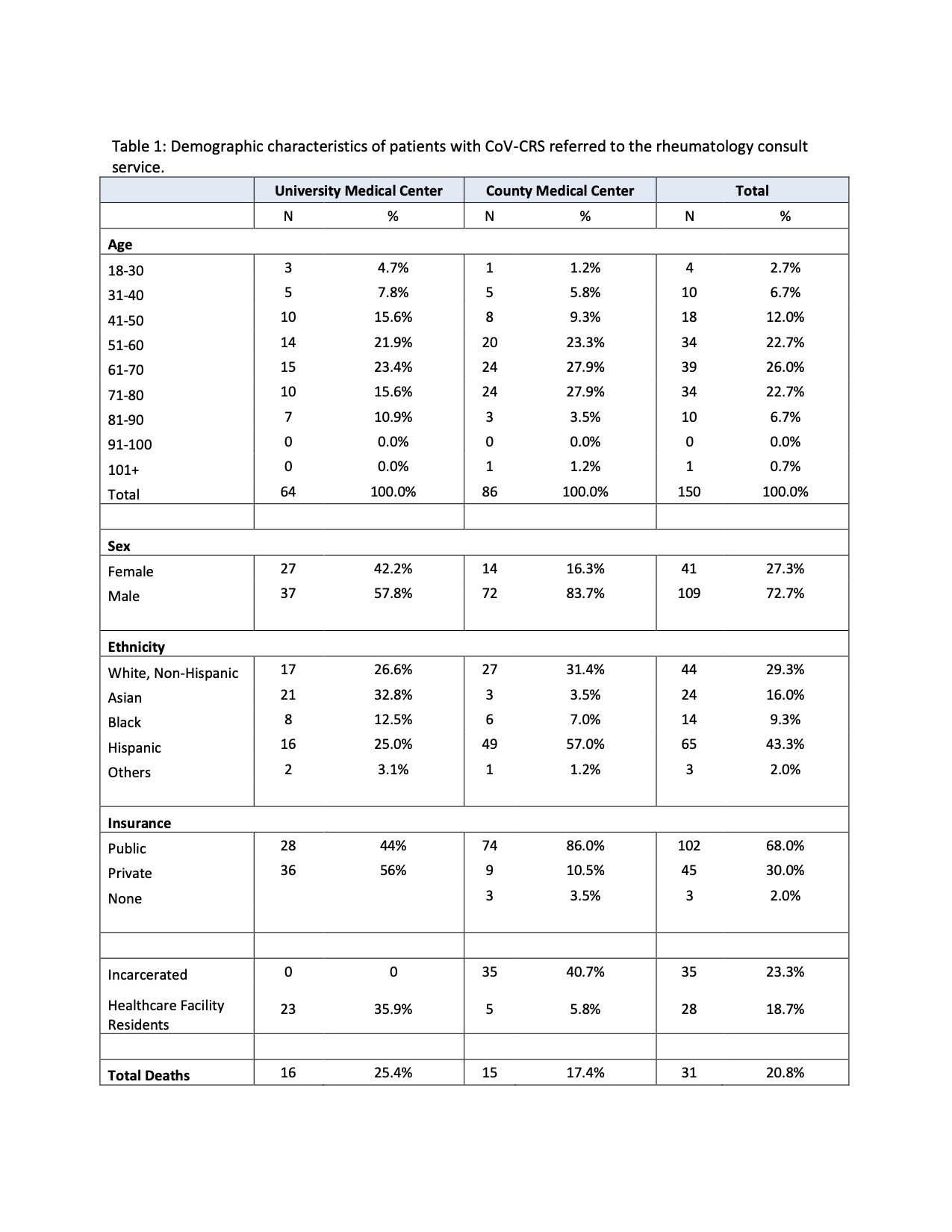Session Information
Session Type: Poster Session A
Session Time: 9:00AM-11:00AM
Background/Purpose: The severe acute respiratory syndrome coronavirus 2 (SARS-CoV-2) has led to the present coronavirus disease (COVID-19) pandemic. Multiple epidemiologic reports across the country show that COVID-19 disproportionately affects minorities.
San Bernardino and Riverside counties comprise two of the geographically largest and ethnically diverse counties in California and in the United States. Much of its population is indigent and relies on public health services.
A rheumatology-driven protocol was developed in March 2020 for the management of patients with cytokine release syndrome due to COVID-19 (CoV-CRS) at a university-based and a county hospital. This study analyzes the demographic disparities among this patient population.
Methods: 150 patients were included in this retrospective chart review study with data collected between March 15-May 30, 2020. Hospital-based electronic medical records were utilized to collect information on patients referred to the rheumatology consult service for the evaluation of CoV-CRS. Demographic data, including age, sex, ethnicity, and postal zip code entered on hospital admission was collected. Co-morbidities, medications used and various laboratory data, including CBC with differential, ferritin, fibrinogen, complete metabolic profile, autoantibody profiles were included. Hospital-based and county-reported data were utilized to determine general populations affected by COVID-19. Descriptive statistics were used for analysis.
Results: 71.3% (107/115) of patients were within the 51-80 year-old age group (mean age 61.7 years). Males comprised 72.7% of the cohort. Hispanics represented the majority of this population (43.3%), followed by White non-Hispanics (29.3%), Asians (16%) and Blacks (9.3%). Public insurance was used in 68%, and private insurance in 30%. Thirty-five patients (23.3%) were incarcerated at the time of hospitalization; while 28 (18.7%) were from various healthcare facilities including skilled nursing facilities.
Patients came from a total of 53 postal zip codes, but 52% resided in 7 zip codes: 91710 (30); 92553 (11); 92324 (13, including 7 from one healthcare facility); 92551 (7); 92571 (7); 92501(5); 92555 (5). Census data shows that the population at these zip codes are predominantly Hispanic (47.6-74.5%). Four of these zip codes are represented by 18.4-41.5% greater poverty rates compared to their respective counties. Of 31 patients who died in our cohort, 18 (58%) were residents of these zip codes.
Of note, 29/30 patients located at zip code 91710 were incarcerated at a local state prison for men. Twenty (69%) were white non-Hispanic; 7 (24.1%) were Hispanic; 1 (3.4%) Asian and 1 (3.4%) Black. There was a total of 10 Covid-19 related deaths in the California prison system, 4 of which were part of this cohort.
Conclusion: A higher percentage of patients affected with CoV-CRS in this rheumatology-managed cohort from Southern California were largely male, of Hispanic ethnicity, used public insurance, living in an area with higher poverty rate, or were incarcerated or residents at a healthcare facility. More than half of deaths in the cohort were observed in this particular population.
 Demographic characteristics of patients with CoV-CRS referred to the rheumatology consult service
Demographic characteristics of patients with CoV-CRS referred to the rheumatology consult service
 Demographic characteristics of zip codes with the highest number of patients referred for CoV-CRS
Demographic characteristics of zip codes with the highest number of patients referred for CoV-CRS
To cite this abstract in AMA style:
Karim M, Injean P, Lee S, Chiruvolu N, Doo L, Panikkath D, Jose D, Yu M, Lafian A, Sandhu V, Torralba K, Downey C, Hojjati M, Cabling M. Demographic Disparities in the Medically Underserved Populations of Southern California: A Rheumatology Cohort of Cytokine Release Syndrome Patients Due to COVID-19 [abstract]. Arthritis Rheumatol. 2020; 72 (suppl 10). https://acrabstracts.org/abstract/demographic-disparities-in-the-medically-underserved-populations-of-southern-california-a-rheumatology-cohort-of-cytokine-release-syndrome-patients-due-to-covid-19/. Accessed .« Back to ACR Convergence 2020
ACR Meeting Abstracts - https://acrabstracts.org/abstract/demographic-disparities-in-the-medically-underserved-populations-of-southern-california-a-rheumatology-cohort-of-cytokine-release-syndrome-patients-due-to-covid-19/
